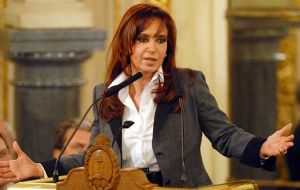MercoPress. South Atlantic News Agency
Mrs. Kirchner will call at G20 for a new world financial order
 President Cristina Fernandez
President Cristina Fernandez Argentine President Cristina Fernandezde Kirchner said on Sunday before Congress that the global financial crisis should provide momentum to change how the international financial system works, eliminate fiscal havens and reformulate multilateral credit organizations.
Mrs. Kirchner called on the International Monetary Fund and World Bank to extend aid to countries without conditions, a position she said she'll push at the annual meeting of the world's 20 biggest economies in London on April 2. She said developing countries have been punished by a financial system in which regulations "only apply to weak and emerging economies." "There needs to be reform of the multilateral lending agencies, which have until today operated by forcing restrictions on emerging markets" Mrs. Kirchner said in her 70-minute speech to Congress which marks the beginning of this year's legislative session and is a mild version of a state of the union. "The IMF and World Bank need to be changed into instruments of financing without conditionality; we need to reformulate the Bretton Woods pact", she underlined. "Eliminating fiscal havens must be another objective, said the Argentine president since "an estimated 40% of all the world's funds are deposited there". Additional financing for emerging markets could help Argentina overcome slowing growth as auto factories and metal producers slash output and tensions rise with farmers over exports and taxes. Industrial production declined 6.1% in January from the previous month and auto sales fell 39% from a year earlier. New tools are needed to help the government "intervene" in the economy to protect jobs and maintain economic growth, Mrs. Kirchner insisted, without elaborating. Reports last week that the government may take over the country's grains trade could spark social unrest, farmers said a year after farm protests paralyzed the country and prompted food shortages. "We have a completely new situation: The crisis is similar to the depression of 1930 but others compare it to the fall of the Berlin Wall (1989), with the difference the wall fell on this side this time", said Mrs. Kirchner who went on to support the unorthodox economic policies which her husband (Nestor Kirchner) begun in 2003, cutting all links with the IMF and the Washington Consensus Mrs. Kirchner recalled that the Argentine economy has been growing sustainedly since then at an annual average of 9%, guided by an "accumulative, inclusive and distributive process". In 2008, exports reached 70 billion US dollars and the budget primary surplus 4.6% of GDP. However she admitted 2009 could be the worst year in a century because of the financial collapse of the US and its domino effect on other economies. The ruling Kirchner coalition next October faces mid term elections with the renewal of a third of Senate benches and half the Lower House. Mrs. Kirchner public opinion standing remains stagnant at 30% and a coalition of dissidents from the majority Justicialista party are planning to challenge the couple's six year dominance of the Argentine political scenario. Mrs. Kirchner again criticized Argentine farmers for not selling grains stored from previous harvests, saying such a move would help boost growth. "Every day we read news about more banks collapsing, layoffs, and bankrupt factories," Fernandez said. "Who today can afford not to sell their goods?" The leaders of Argentina's biggest farm groups are scheduled to meet for a second round of negotiations with Production Minister Debora Giorgi on March 3. Plans were announced February 24 to eliminate dairy taxes, but farmers are calling for an easing of export duties mainly on soybeans and other grains. The government has admitted it can't afford to loose that revenue. Mrs. Kirchner also called on the Justice system to accelerate the human rights violations and state terrorism trials which are still pending from the last military dictatorship, (1976/1983). The Argentine president finally appealed to her former peers saying times are tough, challenging and called on the opposition to cooperate and act with solidarity helping the government's performance. However not a word was mentioned about the statistics controversy and the alleged manipulation of inflation and other indexes which has been criticized by the business sector, trade unions, banks and the opposition, nor the growing cases of alleged corruption involving her husband or his political cronies.




Top Comments
Disclaimer & comment rulesCommenting for this story is now closed.
If you have a Facebook account, become a fan and comment on our Facebook Page!